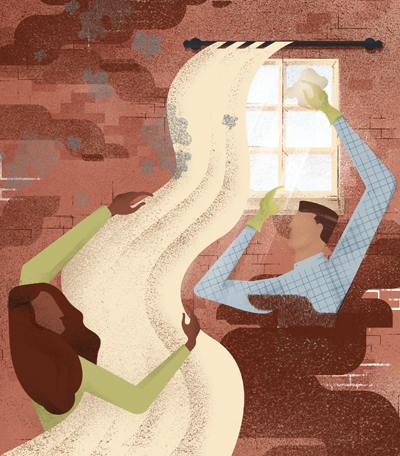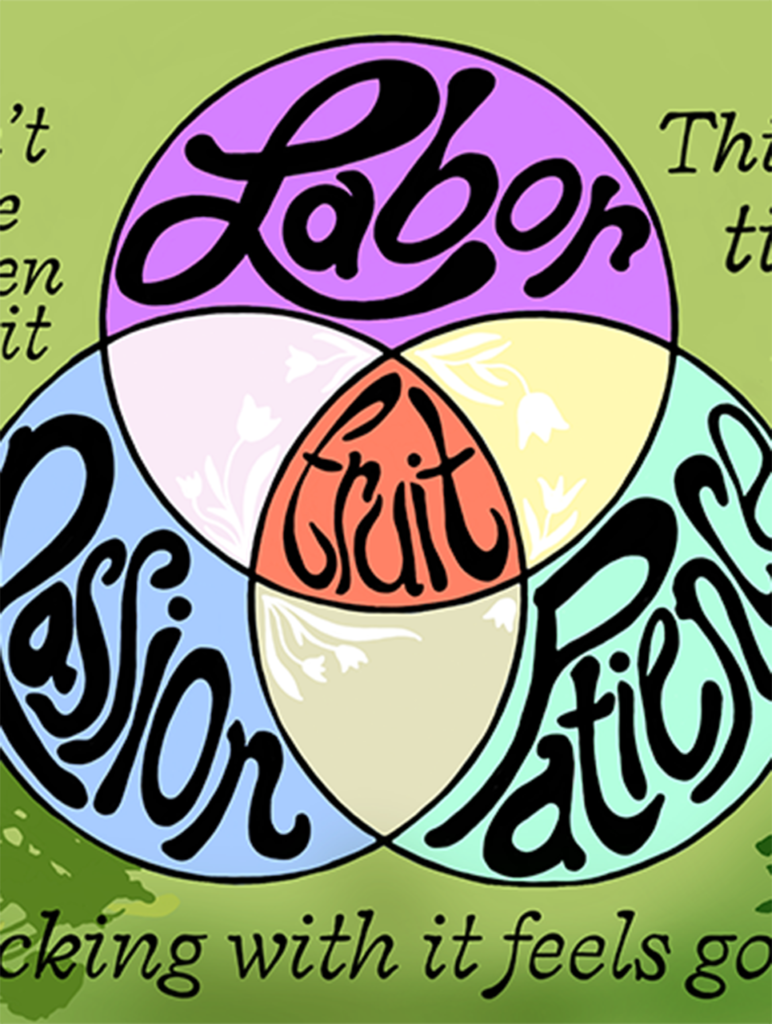Illustration by Mike L. Perry
Clean Slate
by Anna Herman
Every product you use in your home affects the quality of the air you breathe, the water quality downstream of your drain, and has had some manufacturing, packaging and distribution impact in communities of humans along the way. Switch some of your day-to-day cleaning supplies to ones made from pantry ingredients, and limit your environmental impact without sacrificing fresh, clean surfaces.
Baking soda is mildly abrasive and has natural deodorizing properties, which makes it a powerful ally and a replacement for harsher scouring powders and chemical deodorizers. Sprinkle baking soda onto a damp sponge to clean sinks or grimy bathtubs. Make a paste of baking soda and water to tackle the tougher crud left behind on the stovetop or inside the oven. If you didn’t grow up with an open box of baking soda tucked into the back of the fridge and freezer to absorb odors, make sure your kids do.
Mildly acidic white vinegar will dissolve dirt, soap residue and hard water deposits from smooth surfaces, yet is gentle enough, mixed with water, to clean hardwood flooring. Diluted it is the simplest of all-purpose cleansers. Use it full strength with a balled-up newspaper for streak-free windows.
White vinegar is a natural deodorizer that absorbs odors instead of covering them up. The vinegar smell dissipates quickly, and if mixed with an essential oil such as lemon, sweet orange or lavender, it will leave a fresh scent behind.
Lemon is also a potent deodorizer. Cut a lemon into halves and rub the cut surface on wooden cutting boards or counters to both clean and neutralize onion and garlic smells. Rinse with warm water. Lemon juice and olive oil is great for all your wood counters and furniture. Throw the half lemon into your garbage disposal to freshen and clean the blades.
If you aren’t going to make your own products, look for the least toxic product that will do the job. Many retailers and co-ops carry excellent nontoxic cleaning supplies, and the best even have product refill stations to eliminate the need to buy a new plastic bottle.
All of us need some references on how to clean specialty surfaces or materials throughout our homes—especially stains and spills such as wine, blood and melted wax. The Web has many resources—and contradictory advice. A go-to guide at our house is the 1999 book by Cheryl Mendelson, “Home Comforts: The Art and Science of Keeping House.” After all, there is no place like (a clean) home.
All-Natural Cleaning Recipes
Wood Furniture Dusting, Cleaning & Polish:
- 1 cup olive or jojoba oil
- 3 tablespoons lemon juice
Mix in a bowl or jar. Use a lint-free cloth to rub the lemon oil sparingly and evenly on wood surfaces to renew and clean.
Basic Spray Cleaner:
- 2 cups water
- 1 cup white vinegar
Optional: up to 25 drops essential oil of your choice (e.g., lemon, lavender, basil, sweet orange, peppermint, tea tree)
Mix in a spray bottle. Spritz and wipe as needed.
Spray Cleaner for Greasy Surfaces:
- 2 cups water
- 1 cup vinegar or 1/2 cup lemon juice
- 1 teaspoon natural dish soap such as Ecover or Dr. Bronner’s
Mix in a spray bottle. Spray and wipe down with a damp cloth as needed.
Bath & Shower Cleaner:
- Baking soda
Sprinkle 1 to 2 teaspoons on a damp sponge and wipe. Rinse with warm water. For old crud and soap scum, mix baking soda with very warm water until it forms a thin paste. Using a damp sponge, spread the paste over the surfaces. Let sit for 5 to 10 minutes. Wipe down with water. For moldy surfaces, wipe down the paste with full-strength white vinegar and then warm water.









